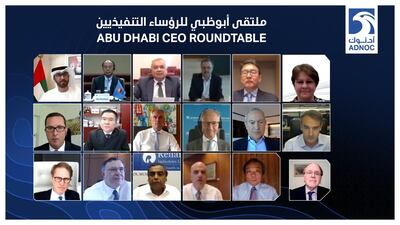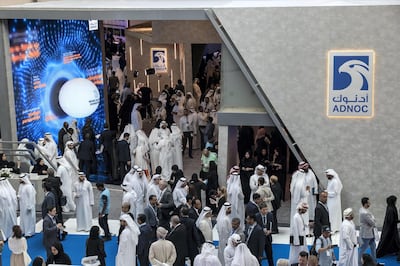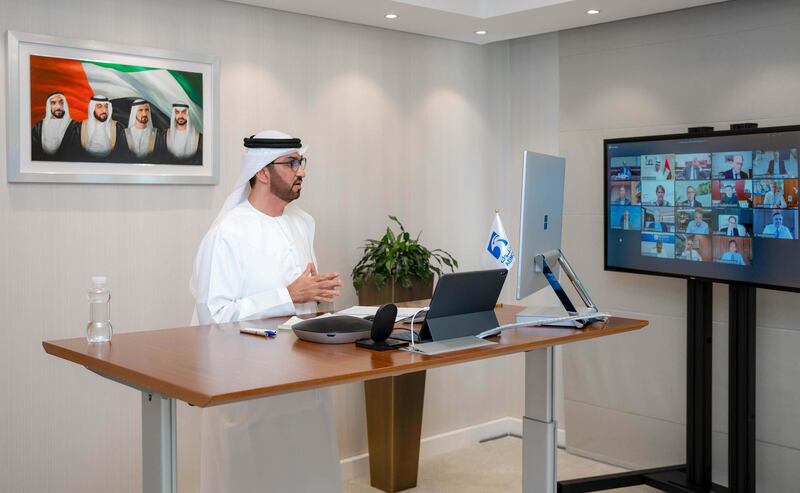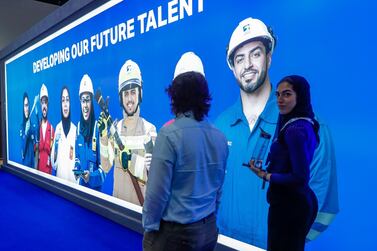Abu Dhabi's ability to virtually convene the world's leading oil and gas sector chief executives has been instrumental amid the disruption caused to the industry by the pandemic crisis.
At an online gathering last Tuesday, seventeen CEOs shared ideas about the challenges and opportunities ahead, including remote working and maintaining momentum on sustainability efforts.
The Abu Dhabi National Oil Company's annual CEO meetings are normally held in the UAE capital in November to coincide with Adipec, one of the biggest energy exhibitions and conferences in the world, which Adnoc also hosts.
Last year for example, Sheikh Mohamed bin Zayed, Crown Prince of Abu Dhabi and Deputy Supreme Commander of the Armed Forces, attended the CEO gathering held at Adnoc's headquarters.
However, Dr Sultan Al Jaber, Adnoc group chief executive and Minister of State, hosted this year's - the fifth - earlier than usual and online.
Joining the discussion were Amin Nasser of Saudi Aramco, Patrick Pouyanné of France's Total, BP's Bernard Looney, Claudio Descalzi of Italy's Eni and Mukesh Ambani from India's Reliance Industries. Also joining were Takayuki Ueda of Japan's Inpex, Dai Houliang of China's CNPC, Nassef Sawiris of OCI, Philippe Boisseau from Cepsa, Vicki Hollub of Occidental Petroleum and Alfred Stern of Austria's Borealis. Vagit Alekperov of Russia's Lukoil, Liu Yijiang of ZheunHua Oil, Yongsoo Huh of Korea's GS Energy, Rainer Seele of OMV and Mario Mehren of Germany's Wintershall were also on the video call.

"Abu Dhabi has a demonstrated ability to look down the road and see future issues," Daniel Yergin, vice chairman of IHS Markit, the global research and information company, told The National. Dr Yergin is author of The Prize, for which he received the Pulitzer Prize, and The Quest. His new book, The New Map: Energy, Climate, and the Clash of Nations, comes out in September.
"I write about that capacity in my new book. Adnoc has become a thought leader in the global industry, and that contributes to its competitive position and that of Abu Dhabi," said Dr Yergin, who has chaired the meetings since they began.
The UAE is sixth highest in the world in terms of oil and gas reserves, according to US Energy Information Administration data - most of that comes from Abu Dhabi.
While industry leaders do regularly come together to talk and share ideas at major conferences – such as Adipec, CeraWeek in Houston and the World Economic Forum in Davos – temporarily putting aside their competitive spirit, physical conferences have been cancelled in the wake of the pandemic.
"Some of the chief executives are actually working from home. So the industry leaders found it very constructive to talk about how the world, the industry, and the future of work have been changed by this great disruption," said Dr Yergin of last week's CEO event.
"All the plans and budgets that companies had at the beginning of 2020 have been overwhelmed by the turmoil of the coronavirus, the economic shutdown, and the collapse in demand and prices. So it was very significant for these industry leaders to be able to discuss how their companies have dealt with the virus and the learnings that have come out of it, and assess how the trends that were expected for the future have been changed and what that means for the industry."
Fifth Abu Dhabi CEO Roundtable Convenes Virtually, Bringing Industry Together around Common Purpose of Ensuring Sustainable Global Energy Supplies.https://t.co/o7Kh3ejUh7
— ADNOC Group (@AdnocGroup) June 17, 2020
Martin Fraenkel, president of S&P Global Platts, a provider of energy and commodities information, agreed that it is more important than ever to maintain this connectivity.
He told The National: "The energy industry has learned many things about maintaining efficient operations during lockdown, but we also know that we are an industry where simply maintaining the status quo will not deliver the solutions needed to address energy transition. For that, the industry needs to come together – even virtually – for live brainstorming to exchange knowledge and surface new ideas."
Global oil demand is not expected to recover until 2022 amid a slowdown in air traffic as a result of the effects of the pandemic, according to the International Energy Agency. The agency forecasts that an investment of $1 trillion, equivalent to 0.7 per cent of global economic output, is needed over the next three years to sustainably rebuild economies. The crisis has also accelerated the transformation of the world economy to one based on lower carbon intensity, according to BP.
Dr Yergin said, as companies explore ways to adapt, being able to discuss these trends with each other brings into sharper focus the challenges that lie ahead.
"There’s no question that the world is changing and companies are adapting in different ways. Understanding the thinking behind the strategies and the choices that different companies are making brings important clarity at a time of change. For instance, there was keen interest in how the crisis will affect the sustainability agenda and what companies do about it," he said.
#BP CEO Bernard Looney is looking forward to the upcoming virtual edition of the Abu Dhabi CEO Roundtable. pic.twitter.com/VFerZVPIh9
— ADNOC Group (@AdnocGroup) June 12, 2020
Another topic of discussion was the future of the workplace. There were different viewpoints with "the thinking of one CEO as to why that company expects to have 25 per cent of its employees work at home permanently, while another says that it is important to get people back into the office as soon as possible."
There have been numerous challenges in recent years, notably the oil price slump of 2016, which major companies have been very open about in how they are attempting to surmount them, at least in terms of top-level thinking. Abu Dhabi has helped to create a fruitful landscape for discourse. Along with being an occasion to host the dedicated gathering for top chief executives, Adipec has developed to become "a premier global industry and technology conference", Dr Yergin said. The event is a showcase for Abu Dhabi's position as a hub for innovation and progress.
“Oil and Gas 4.0” was the theme for last November's week-long conference as upstream companies examined how best to navigate a bearish oil market, slowing global economic growth and demand concerns, as well as a much more prevalent environmental narrative.

The world's biggest oil and gas companies all had a presence at Adipec and the opening panel discussion of the conference included Condoleezza Rice, former US Secretary of State, UAE Minister of Energy Suhail Al Mazrouei, Dharmendra Pradhan, India’s Minister of Petroleum and Mohammed Barkindo, secretary general of Opec.
Adnoc has also been able to leverage the inclusive nature of the gatherings it hosts to develop "its distinctive strategies around partnerships", Dr Yergin said.
The company has undergone a transformation since Dr Al Jaber became its chief executive in early 2016, becoming a more nimble and commercially-focused organisation. Tie-ups with other leading companies around the world have spanned a wide range of areas including carbon capture, petrochemicals, infrastructure, storage and technologies such as artificial intelligence.








